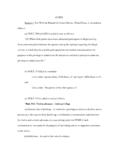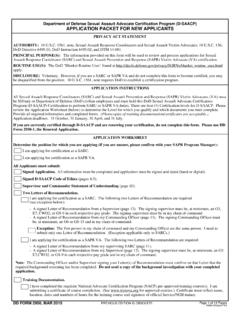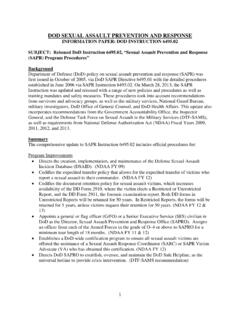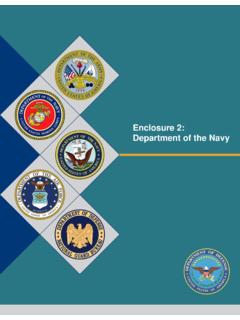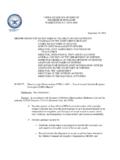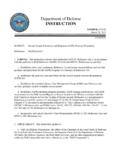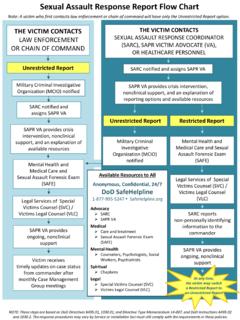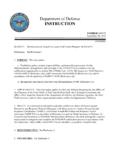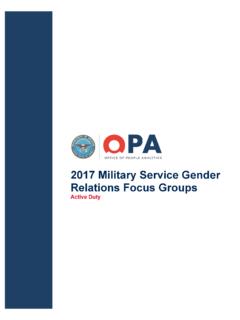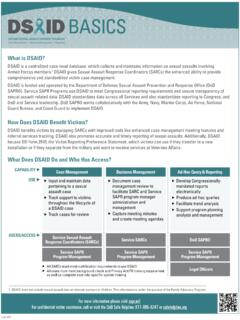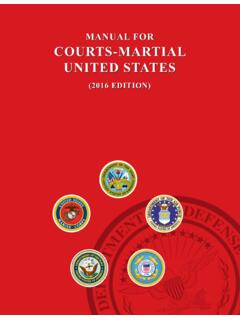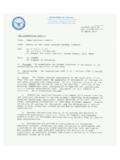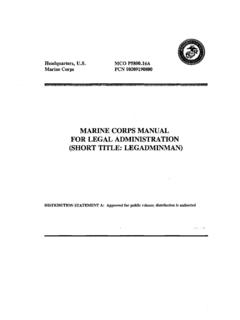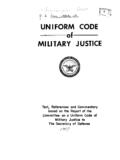Transcription of ¶59.c.(2) Article 134 - SAPR
1 (2) Article 134 cific offense set forth in this manual , the elements of proof are the same as those set forth in the para-graph which treats that specific offense, with the additional requirement that the act or omission con-s t i t u t e s c o n d u c t u n b e c o m i n g a n o f f i c e r a n d gentleman.(3)Examples of offenses. Instances of violation of this Article include knowingly making a false official statement; dishonorable failure to pay a debt; cheat-ing on an exam; opening and reading a letter of another without authority; using insulting or defama-t o r y l a n g u a g e t o a n o t h e r o f f i c e r i n t h a t o f f i c e r s presence or about that officer to other military per-sons; being drunk and disorderly in a public place; public association with known prostitutes; commit-t i n g o r a t t e m p t i n g t o c o m m i t a c r i m e i n v o l v i n g moral turpitude; and failing without good cause to support the officer s family.
2 Included offense. Article 80 attempts punishment. Dismissal, forfeiture of all pay and allowances, and confinement for a period not in excess of that authorized for the most analo-gous offense for which a punishment is prescribed in this manual , or, if none is prescribed, for 1 year. specifications. (1)Copying or using examination paper. In that (personal jurisdiction data), did, (at/on board location), on or about 20 , while undergoing a written examination on the sub-ject of , wrongfully and dishonorably ( r e c e i v e ) ( r e q u e s t ) u n a u t h o r i z e d a i d b y ( ( u s i n g ) (copying) the examination paper of )) ( ).(2)Drunk or disorderly. In that (personal jurisdiction data), was, (at/on board location), on or about 20 , in a public place, to wit: , (drunk) (dis-orderly) (drunk and disorderly) while in uniform, to the disgrace of the armed forces.
3 60. Article 134 General Article of statute. Though not specifically mentioned in this chap-ter, all disorders and neglects to the prejudice of good order and discipline in the armed forces, all conduct of a nature to bring discredit upon the armed forces, and crimes and offenses not capi-tal, of which persons subject to this chapter may be guilty, shall be taken cognizance of by a gener-al, special, or summary court-martial, according to the nature and degree of the offense, and shall be punished at the discretion of that court. proof required for conviction of an offense under Article 134 depends upon the nature of the misconduct charged. If the conduct is pun-ished as a crime or offense not capital, the proof must establish every element of the crime or offense as required by the applicable law. If the conduct is punished as a disorder or neglect to the prejudice of good order and discipline in the armed forces, or of a nature to bring discredit upon the armed forces, then the following proof is required: (1) That the accused did or failed to do certain acts; and (2) That, under the circumstances, the accused s conduct was to the prejudice of good order and discipline in the armed forces or was of a nature to bring discredit upon the armed forces.
4 (1)In general. Article 134 makes punishable acts in three categories of offenses not specifically cov-ered in any other Article of the code. These are referred to as clauses 1, 2, and 3 of Article 134. Clause 1 offenses involve disorders and neglects to the prejudice of good order and discipline in the armed forces. Clause 2 offenses involve conduct of a n a t u r e t o b r i n g d i s c r e d i t u p o n t h e a r m e d f o r c e s . Clause 3 offenses involve noncapital crimes or of-fenses which violate Federal law including law made applicable through the Federal Assimilative Crimes Act,seesubsection (4) below. If any conduct of this nature is specifically made punishable by another Article of the code, it must be charged as a violation of that Article . Seesubparagraph (5)(a) below. How-ever,seeparagraph 59cfor offenses committed by commissioned officers, cadets, and midshipmen.
5 (2)Disorders and neglects to the prejudice of g o o d o r d e r a n d d i s c i p l i n e i n t h e a r m e d f o r c e s (clause 1). (a)To the prejudice of good order and disci-pline. To the prejudice of good order and disci-pline refers only to acts directly prejudicial to good order and discipline and not to acts which are preju-dicial only in a remote or indirect sense. Almost any irregular or improper act on the part of a member of the military service could be regarded as prejudicial in some indirect or remote sense; however, this arti-cle does not include these distant effects. It is con-fined to cases in which the prejudice is reasonably IV-100 Article 134 (4)(c)(ii)direct and palpable. An act in violation of a local civil law or of a foreign law may be punished if it constitutes a disorder or neglect to the prejudice of good order and discipline in the armed forces.
6 How-e v e r , s e e R . C . M . 2 0 3 c o n c e r n i n g s u b j e c t - m a t t e r jurisdiction.(b)Breach of custom of the service. A breach of a custom of the service may result in a violation of clause 1 of Article 134. In its legal sense, cus-tom means more than a method of procedure or a mode of conduct or behavior which is merely of frequent or usual occurrence. Custom arises out of long established practices which by common usage have attained the force of law in the military or other community affected by them. No custom may be contrary to existing law or regulation. A custom which has not been adopted by existing statute or regulation ceases to exist when its observance has b e e n g e n e r a l l y a b a n d o n e d . M a n y c u s t o m s o f t h e service are now set forth in regulations of the vari-o u s a r m e d f o r c e s.
7 V i o l a t i o n s o f t h e s e c u s t o m s should be charged under Article 92 as violations of the regulations in which they appear if the regulation is punitive. Seeparagraph 16c. (3)Conduct of a nature to bring discredit upon the armed forces (clause 2). Discredit means to injure the reputation of. This clause of Article 134 makes punishable conduct which has a tendency to bring the service into disrepute or which tends to lower it in public esteem. Acts in violation of a local civil law or a foreign law may be punished if they are of a nature to bring discredit upon the armed forces. However, 203 concerning sub-ject-matter jurisdiction. (4)Crimes and offenses not capital (clause 3). (a)In general. State and foreign laws are not included within the crimes and offenses not capital referred to in this clause of Article 134 and viola-tions thereof may not be prosecuted as such except when State law becomes Federal law of local appli-cation under section 13 of title 18 of the United States Code (Federal Assimilative Crimes Act sees u b p a r a g r a p h ( 4 ) ( c ) b e l o w ).
8 F o r t h e p u r p o s e o f court-martial jurisdiction, the laws which may be applied under clause 3 of Article 134 are divided into two groups: crimes and offenses of unlimited application (crimes which are punishable regardless where they may be committed), and crimes and of-fenses of local application (crimes which are punish-a b l e o n l y i f c o m m i t t e d i n a r e a s o f f e d e r a l jurisdiction).(b)Crimes and offenses of unlimited noncapital crimes and offenses prohib-ited by the United States Code are made applicable under clause 3 of Article 134 to all persons subject to the code regardless where the wrongful act or omission occurred. Examples include: counterfeiting (18 471), and various frauds against the Government not covered by Article 132. (c)Crimes and offenses of local application. (i)In general. A person subject to the code may not be punished under clause 3 of Article 134 for an offense that occurred in a place where the law in question did not apply.
9 For example, a person may not be punished under clause 3 of Article 134 when the act occurred in a foreign country merely because that act would have been an offense under the United States Code had the act occurred in the United States. Regardless where committed, such an act might be punishable under clauses 1 or 2 of Article 134. There are two types of congressional enactments of local application: specific federal stat-utes (defining particular crimes), and a general fed-eral statute, the Federal Assimilative Crimes Act (which adopts certain state criminal laws). (i i ) F e d e r a l A s s i m i l a t i v e C r i m e s A c t ( 1 8 13). The Federal Assimilative Crimes Act is an adoption by Congress of state criminal laws for areas of exclusive or concurrent federal jurisdiction, provided federal criminal law, including the UCMJ, has not defined an applicable offense for the mis-conduct committed.
10 The Act applies to state laws validly existing at the time of the offense without regard to when these laws were enacted, whether b e f o r e o r a f t e r p a s s a g e o f t h e A c t , a n d w h e t h e r before or after the acquisition of the land where the offense was committed. For example, if a person committed an act on a military installation in the United States at a certain location over which the United States had either exclusive or concurrent ju-risdiction, and it was not an offense specifically de-f i n e d b y f e d e r a l l a w ( i n c l u d i n g t h e U C M J ) , t h a t person could be punished for that act by a court-martial if it was a violation of a noncapital offense under the law of the State where the military instal-lation was located. This is possible because the Act adopts the criminal law of the state wherein the m i l i t a r y i n s t a l l a t i o n i s l o c a t e d a n d a p p l i e s i t a s though it were federal law.
